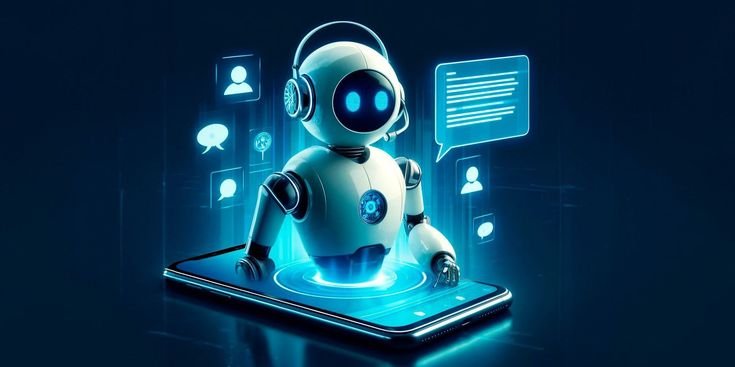Blog
The Role of Artificial Intelligence in Mobile App Development
Mobile App Development ▪ 2025-03-07

Artificial Intelligence (AI) is revolutionizing mobile app development by enabling smarter, faster, and more intuitive applications. AI-powered mobile apps enhance user experience (UX), automate processes, personalize interactions, and improve overall efficiency. Whether through chatbots, voice recognition, image processing, or predictive analytics, AI has become a game-changer for businesses looking to stay ahead in the digital landscape.
In this blog, we’ll explore the impact of AI in mobile app development, the key AI-driven features, and how AI is shaping the future of mobile applications.
Why AI is Important in Mobile App Development
1. Enhances User Experience (UX)
AI-driven mobile apps provide a personalized experience by analyzing user behavior, preferences, and past interactions. Features such as recommendation engines, voice assistance, and intelligent search functions make apps more engaging and user-friendly.
2. Improves Efficiency with Automation
AI helps automate repetitive tasks, reducing human intervention and streamlining workflows. For instance, AI-powered chatbots handle customer inquiries, freeing up human agents for complex queries.
3. Enables Smarter Decision-Making
With AI-powered data analytics, businesses can make informed decisions by predicting user trends, optimizing marketing strategies, and enhancing product development.
4. Boosts App Security
AI strengthens cybersecurity by detecting fraudulent activities, recognizing suspicious behavior, and preventing data breaches in real-time.
5. Supports Natural Language Processing (NLP)
NLP enables mobile apps to understand, interpret, and respond to human language, powering features like voice assistants (Siri, Google Assistant) and AI-driven chatbots.
AI-Powered Features in Mobile Apps
1. AI Chatbots and Virtual Assistants
AI-powered chatbots, such as ChatGPT, Google Bard, and IBM Watson, enhance customer service by responding to queries in real time. Chatbots are widely used in e-commerce, healthcare, banking, and customer support apps.
Benefits of AI Chatbots:
-
24/7 customer support
-
Instant responses and query resolution
-
Cost-effective and scalable
2. Voice Recognition and Smart Assistants
Voice-enabled AI assistants like Siri, Alexa, and Google Assistant use NLP to understand and execute voice commands, making mobile apps more interactive.
Use Cases:
-
Voice search in e-commerce apps
-
Hands-free navigation in travel and ride-hailing apps
-
Smart home automation apps
3. Image and Facial Recognition
AI-powered image recognition technology enhances security, social media, and e-commerce experiences.
Examples:
-
Face ID unlocking (used in iPhones)
-
AI-powered filters in social media apps (Instagram, Snapchat)
-
Object recognition in shopping apps (Google Lens)
4. Predictive Analytics
AI analyzes user data to provide personalized recommendations and predictions, making apps more intuitive and customer-focused.
Industries Using Predictive Analytics:
-
E-commerce: Product recommendations (Amazon, eBay)
-
Healthcare: Predicting diseases based on symptoms
-
Finance: Fraud detection and credit scoring
5. AI-Powered Personalization
AI customizes user experiences by analyzing browsing history, preferences, and real-time interactions.
Examples:
-
Netflix and YouTube recommending content based on viewing history
-
Spotify and Apple Music suggesting playlists
-
E-commerce apps offering personalized product suggestions
6. AI-Enabled Security Features
AI enhances mobile security by detecting threats, preventing fraud, and ensuring data protection.
AI Security Features:
-
Biometric authentication (fingerprint, facial recognition)
-
AI-driven fraud detection (banking apps)
-
End-to-end encryption (messaging apps like WhatsApp)
How AI is Transforming Different Industries
1. AI in Healthcare Apps
AI is transforming healthcare by providing remote diagnosis, virtual consultations, and personalized treatment plans.
Use Cases:
-
AI chatbots for symptom checking (Ada Health, Babylon Health)
-
AI-powered diagnostic tools (Google’s DeepMind for detecting diseases)
-
Smart wearables for health tracking (Apple Watch, Fitbit)
2. AI in E-Commerce Apps
AI-powered e-commerce apps provide personalized shopping experiences, fraud detection, and automated customer support.
Use Cases:
-
AI-based product recommendations (Amazon, eBay)
-
Virtual try-ons using augmented reality (Sephora, Lenskart)
-
AI-powered chatbots for customer service (H&M, Nike)
3. AI in FinTech Apps
AI enhances financial services by preventing fraud, automating transactions, and providing financial insights.
Use Cases:
-
AI-driven fraud detection (PayPal, Revolut)
-
Automated investment advice (Robo-advisors like Wealthfront)
-
AI-powered customer support (Banking apps like HSBC, JPMorgan)
4. AI in Travel and Hospitality Apps
AI enhances the travel industry by offering personalized recommendations, virtual assistants, and smart booking systems.
Use Cases:
-
AI-powered travel planners (Google Trips, Hopper)
-
Virtual tour guides (AI-powered AR apps)
-
Automated customer support for airlines (Delta, Emirates)
Challenges of AI in Mobile App Development
1. High Development Costs
Integrating AI into mobile apps requires specialized skills, tools, and infrastructure, which can be expensive.
2. Data Privacy Concerns
AI-driven apps collect vast amounts of user data, raising concerns about privacy, security, and ethical use.
3. Need for Large Datasets
AI models require extensive datasets for training, which may be difficult to obtain for new businesses.
4. Complexity in Implementation
Developing AI-powered features demands expertise in machine learning, deep learning, and cloud computing.
Future Trends of AI in Mobile App Development
1. AI-Powered Edge Computing
Edge AI will enable faster data processing by reducing dependence on cloud computing, improving performance and privacy.
2. Advanced AI-Powered Chatbots
Future chatbots will offer more human-like conversations, improving customer engagement.
3. AI for Augmented Reality (AR) and Virtual Reality (VR)
AI will enhance AR/VR experiences, making applications more immersive in gaming, education, and real estate.
4. Hyper-Personalization with AI
AI will enable apps to predict user needs in real time, delivering highly personalized experiences.

